

Be Strong Online. Making Safer Choices Online. Manage Your Online Reputation. Ww2.kqed. UNESCO Launches Five Laws of Media and Information Literacy (MIL) Media and Information Literacy recognizes the primary role of information and media in our everyday lives.
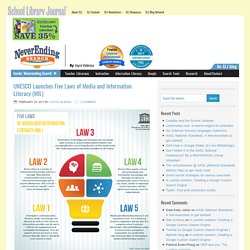
It lies at the core of freedom of expression and information – since it empowers citizens to understand the functions of media and other information providers, to critically evaluate their content, and to make informed decisions as users and producer of information and media content. In essence of course, the 5 Laws focus on competencies that address knowledge in all formats and resonate with our own professional values and standards. In summary they assert: (1) information/media are critical to civic engagement and sustainable development and equally relevant in all forms; (2) every citizen is a creator of information/knowledge; (3) information/media messages are not always value neutral and truth should be made understandable; (4) every citizen has a right to access and understand new information/knowledge/messages; (5) media/information literacy is acquired as a process.
Copyright & Creativity video. Enjoy this useful infographic produced by Knowthenet called Manners Matter.
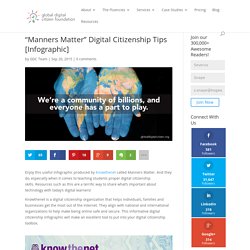
Copyright & Creativity. Cyber Safety Tips. Thanks to our friends at Family Lives in the UK, they have provided us with this great Cyber Safety Tips Fact Sheet!
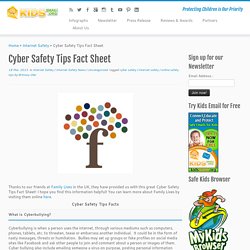
I hope you find this information helpful! You can learn more about Family Lives by visiting them online here. Cyber Safety Tips Facts Cyberbullying is when a person uses the internet, through various mediums such as computers, phones, tablets, etc. to threaten, tease or embarrass another individual. It could be in the form of nasty messages, threats or humiliation. Even though the bullying might not cause physical pain, the emotional effects can be devastating. Never give out your address or personal details.Remember on Twitter everything you say can be open to the world.Never give out your password.Also be extra careful when you sign into Twitter through other websites.Think before you Tweet!
We hear a lot of complaints about stolen identity. Anyone who makes threats to you on the internet could be committing a criminal offense. (Visited 77 times, 1 visits today) Protect My Rep. Cyberbullying Virus. Creative Commons Graphic. Manners Matter Infographic. Creative Commons. Tagged: Cybersmart. THINK Poster. Online Reputation Infographic. You don't have to be running for president to care about your online reputation.
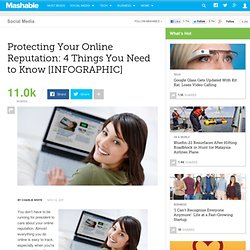
Almost everything you do online is easy to track, especially when you're using social media sites. Oversharing. Digital Dossier. Five-Minute Films. "Digital citizenship" is an umbrella term that covers a whole host of important issues.
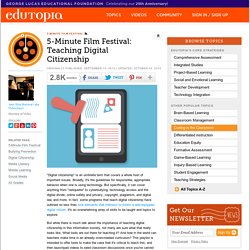
Broadly, it's the guidelines for responsible, appropriate behavior when one is using technology. But specifically, it can cover anything from "netiquette" to cyberbullying; technology access and the digital divide; online safety and privacy; copyright, plagiarism, and digital law, and more. In fact, some programs that teach digital citizenship have outlined no less than nine elements that intersect to inform a well-equipped digital citizen. It's an overwhelming array of skills to be taught and topics to explore. But while there is much talk about the importance of teaching digital citizenship in this information society, not many are sure what that really looks like. Video Playlist: Teaching Digital Citizenship Watch the player below to see the whole playlist, or view it on YouTube.
Junior Poster. Sharing Photo Poster. Digital Footprint. Creative Commons Poster. THINK Poster. Digital Citizenship. Digital footprint. Digizen. Strong Passwords. Digital footprint. One of the great things about being online is the ability to share videos and photos with your friends and seeing their response.
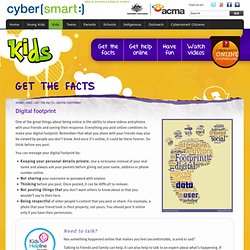
Everything you post online combines to make your digital footprint. Remember that what you share with your friends may also be viewed by people you don’t know. And once it’s online, it could be there forever. So think before you post. You can manage your digital footprint by: Keeping your personal details private. Need to talk? Has something happened online that makes you feel uncomfortable, scared or sad? Digital Citizenship Graphic. Digital citizenship is " the norms of appropriate, responsible behavior with regard to technology use.

"It is the combination of technical and social skills that enable a person to be successful and safe in the information age. Just like literacy and numeracy initiatives which provide people with the skills to ' participate in the work force, digital literacy has become an essential skill to be a confident, connected, and actively involved life long learner.' I personally recommend that teachers and educators should, throughout the entire school year, devote special sessions to just teaching students about Digital Citizenship.
Students need to learn how to act appropriately while using the net and there are several activities and resources to help you do that with them. Check out this section to access some of these resources. I am also sharing with you today a great graphic on the components of digital citizenship.Try out printing it and using it with your students in the classroom. Protect Your Privacy. Nine Elements. Nine Themes of Digital Citizenship Digital citizenship can be defined as the norms of appropriate, responsible behavior with regard to technology use. 1.
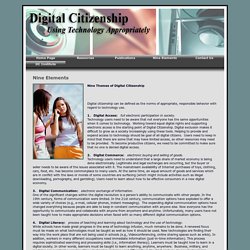
Digital Access: full electronic participation in society.